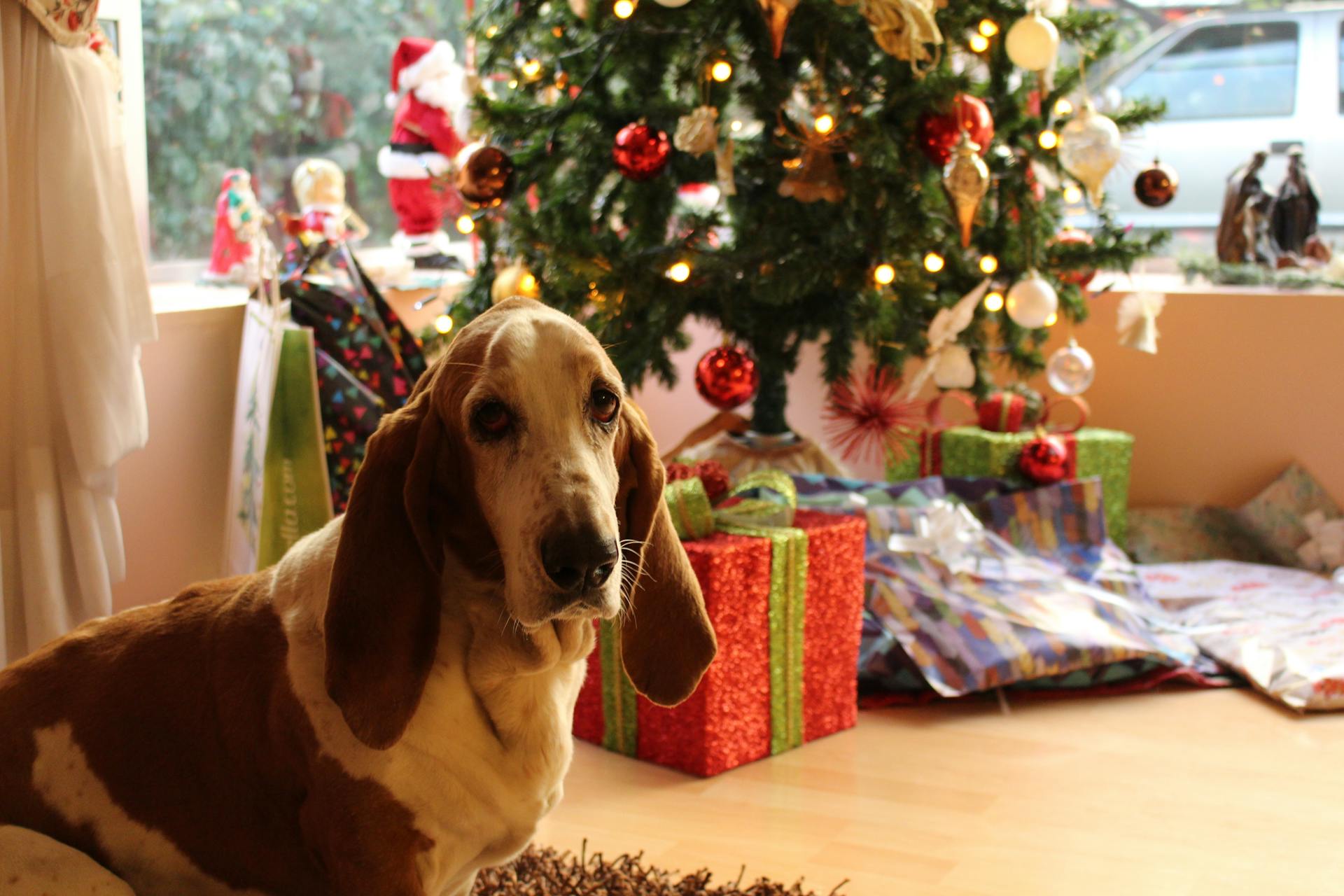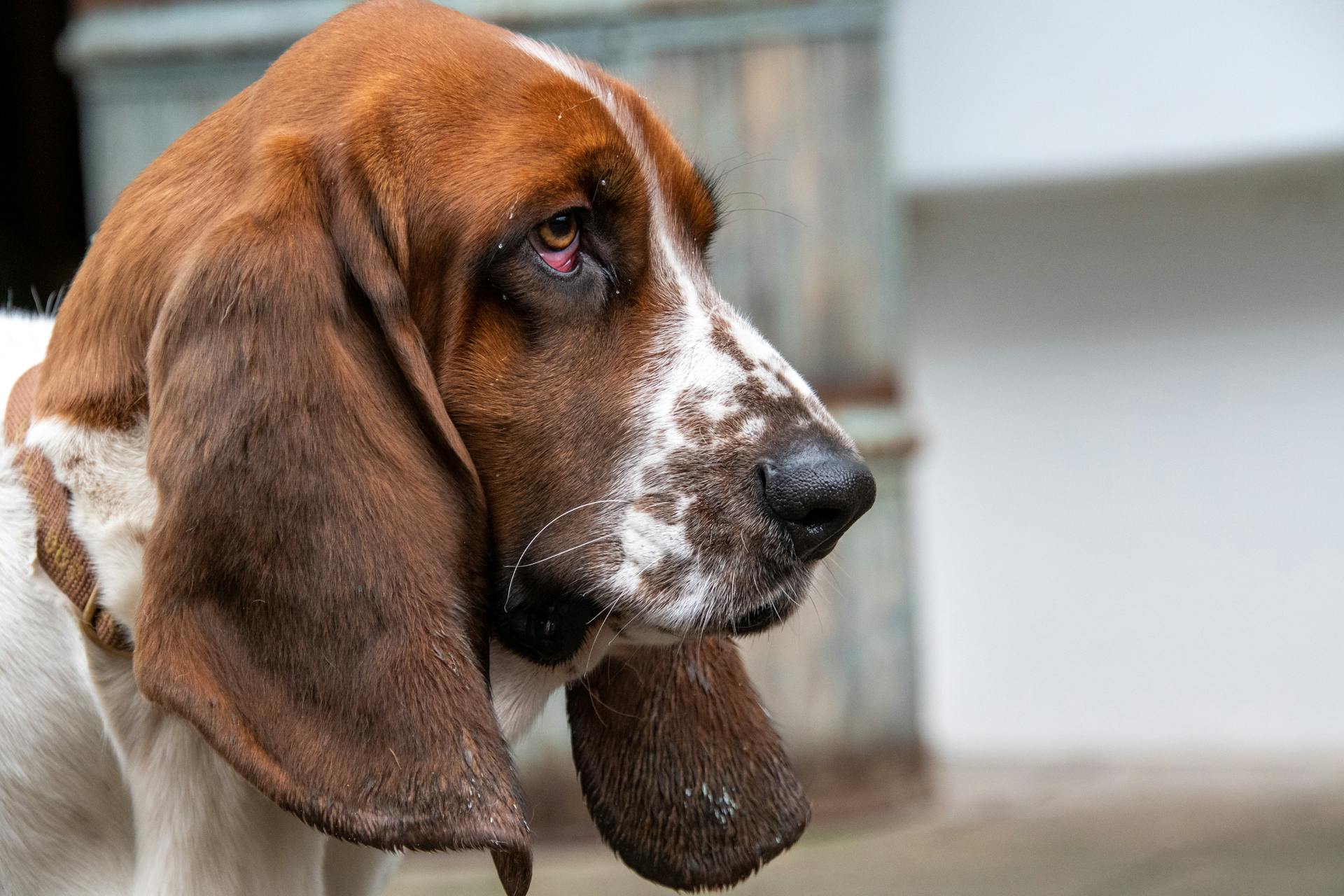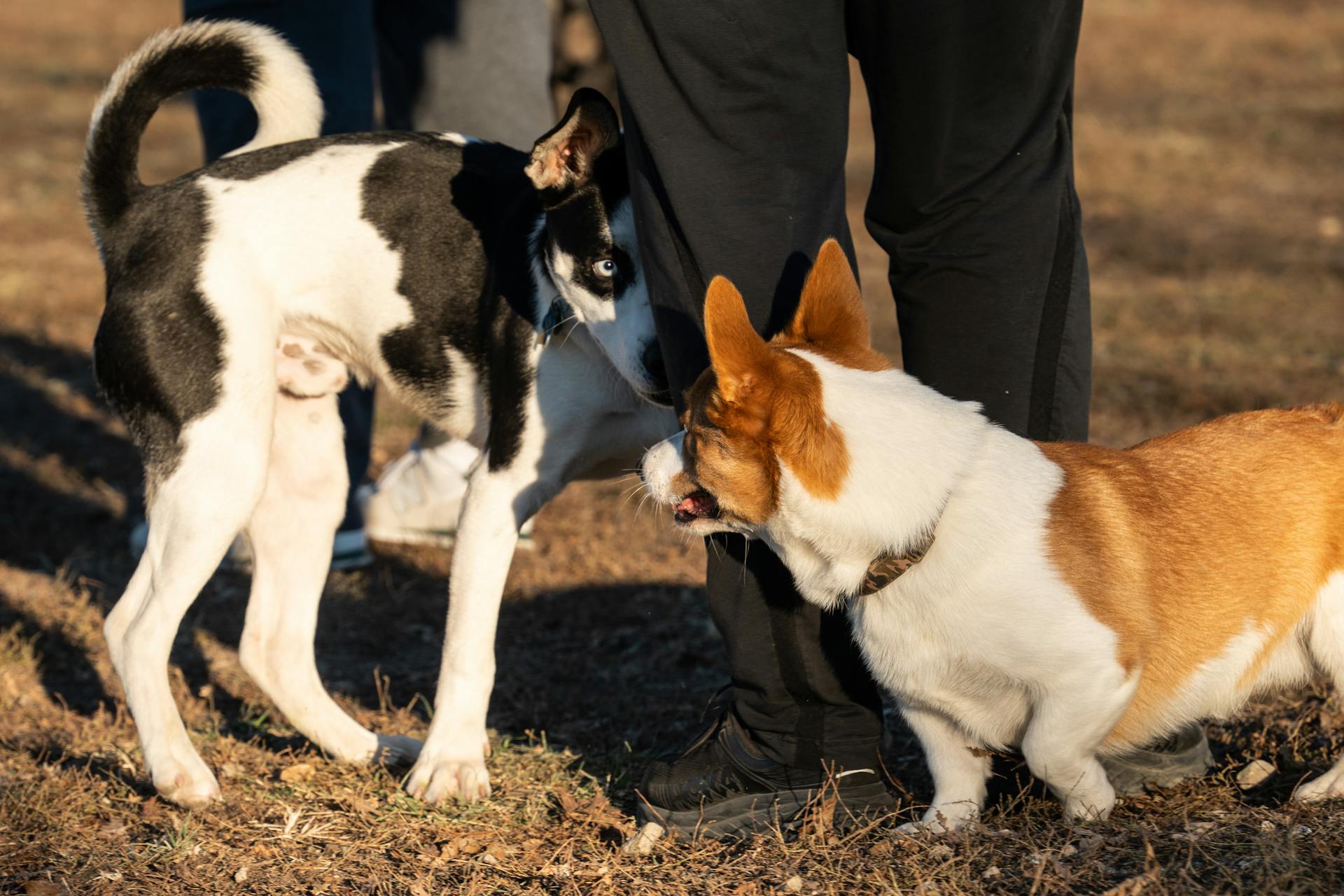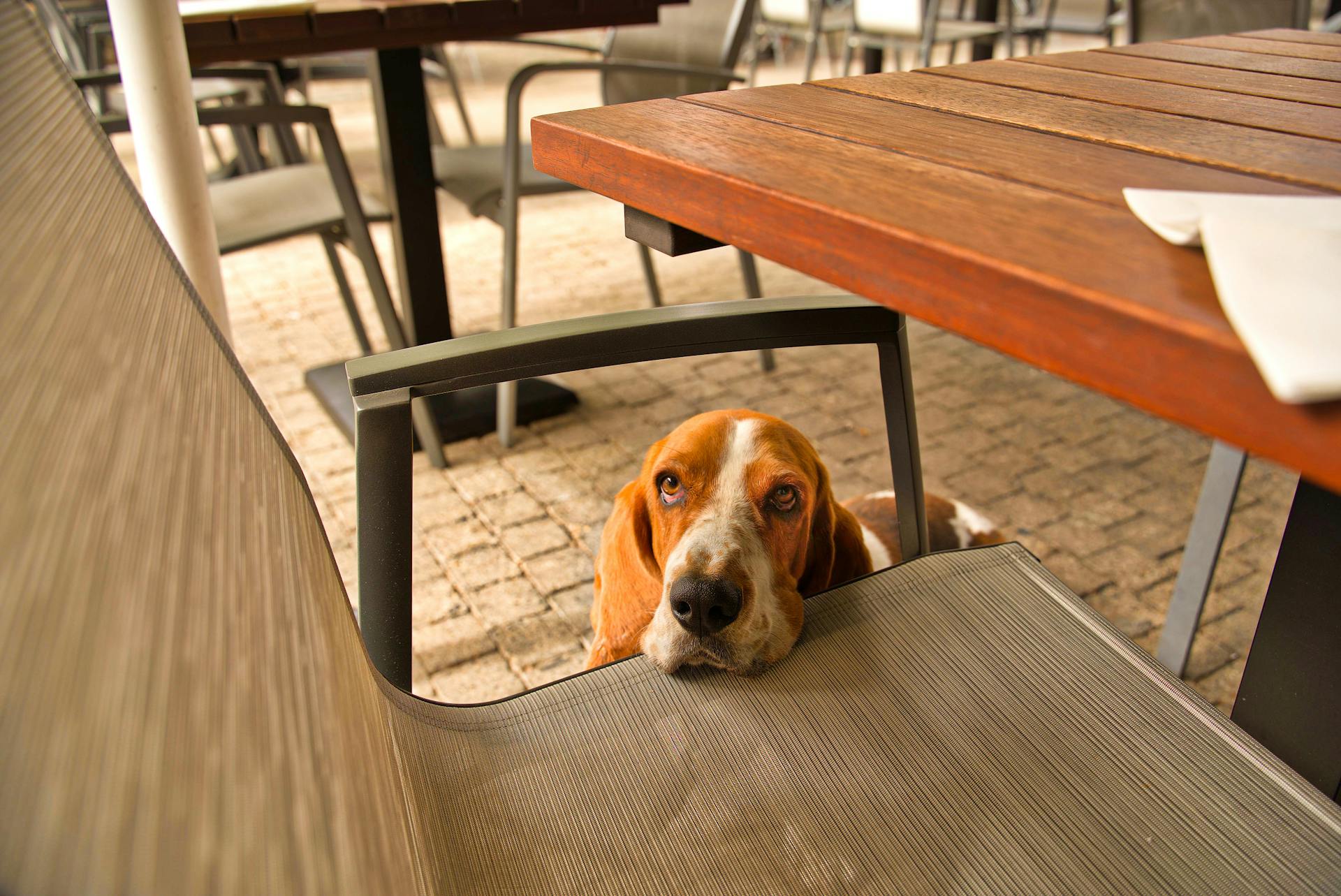
Basset Hounds are known to be quite vocal, and as a pet owner, you should expect to hear a lot of baying and howling from your furry friend. They have a unique way of communicating through their deep, resonant barks.
On average, Basset Hounds bark around 12-15 times per hour, which can be quite frequent. This is because they are a social breed that thrives on interaction and attention from their owners.
Basset Hounds are also prone to baying, which is a loud, drawn-out howl that can be quite ear-piercing. This is often a sign that they're trying to alert you to something or get your attention.
The Good News
Basset Hounds have several qualities that make them good apartment dogs. Their calm and gentle nature makes them a great fit for city living.
They are relatively low-maintenance when it comes to exercise, requiring only short, daily walks. This means they won't need a large yard, making them perfect for apartments.
Basset Hounds are also relatively small in size, which makes them easy to manage in a smaller living space.
Their laid-back personality means they are adaptable to a variety of living situations, including apartments.
The Bad News
Basset Hounds can be vocal when they're lonely, frustrated, excited, or bored.
Their instinct to express themselves through barking and baying was developed to help hunters track their quarry on foot.
They're also fairly protective of their homes and may bark at strangers, which can be a problem in busy apartment buildings with a lot of foot traffic.
Not all Basset Hounds are constant barkers, though, and these may be a better fit for apartments.
You can take steps to keep your Basset Hound quieter, but it's essential to understand that this breed was designed for vocal communication.
Additional reading: Are German Shepherds Talkative
Helping Your Basset Hound
A well-trained, well-socialized Basset Hound is generally calmer and more in control of themselves.
Basic obedience training can help your Basset Hound behave in an apartment.
Daily physical and mental stimulation helps your pup channel the energy they have away from barking and howling.
Basset Hounds are independent dogs but generally don't enjoy being left alone, which can lead to loud behavior.
Providing your Basset Hound with toys and other enrichment can keep them busy while you're away.
If your dog must be left alone all day, consider hiring a dog walker to spend time with them.
Basset Hounds usually get along with other dogs well, so doggy daycare may also be a good option.
Living with someone who works from home or can take the dog to work may be beneficial for a Basset Hound.
If this caught your attention, see: American Bully Personality Traits
Basset Hound Behavior
Basset Hounds are known for their howling, which is a natural behavior for the breed. They have a strong instinct to express themselves through sound, inherited from their hunting heritage.
Basset Hounds are often compared to wolves, and it's no surprise that they howl. With over 220 million olfactory receptors, they have a superior sense of smell that can trigger howling when they detect a specific scent.
Basset Hounds are also highly social dogs that thrive on interaction. They don't enjoy being left alone and can become loud if they're lonely or bored. Providing them with attention, toys, and enrichment activities can help minimize howling.
In fact, giving your Basset Hound plenty of attention when they're quiet can actually help reduce the noise. By engaging them with scent games, walks, and playtime, you can keep them occupied and reduce howling.
Here's an interesting read: Scent Hounds
5 Reasons a Basset Hound Is Howling
Basset Hounds have a natural instinct to howl, which is rooted in their tracking and hunting heritage. This means they're bred to be loud and expressive, so it's no surprise they howl a lot.
Their superior sense of smell, with over 220 million olfactory receptors, can trigger howling when they detect a specific scent. This is especially true if they're left alone and can't engage in scent games to keep them occupied.
Basset Hounds howl to communicate, and it's not always a bad thing. In fact, "little whines" or "baying" are normal and can be a sign that they're just talking to themselves or their surroundings.
However, "big howls" mean your furry friend is calling for your immediate attention, possibly because they're hungry, thirsty, bored, or craving a cuddle or petting.
Being left alone for extended periods can also lead to howling, especially if your Basset Hound is not well-socialized or doesn't enjoy being left alone.
A different take: Do Basset Hounds Howl
Born
Basset Hounds are born with a strong instinct to follow their nose, which is a trait that will serve them well in their future role as hunting companions.
Their short stature and long ears are already visible at birth, and their adult weight can range from 40 to 65 pounds.
Basset Hounds are typically born in litters of 5-7 puppies, and they begin to open their eyes around 10-14 days after birth.
Their adult height is usually between 10-15 inches, which is a result of their unique body structure.
Their short, curved tail is also present at birth, and it will be a prominent feature of their adult appearance.
Basset Hounds are prone to being born with eye problems, such as entropion and ectropion, which can be a concern for responsible breeders.
Additional reading: Are Pit Bulls Born Aggressive
Identifying and Fixing the Problem
Identifying the cause of your Basset Hound's howling is the first step to addressing the issue.
If your neighbors are complaining about your dog's howling while you're away, it's likely that your Basset Hound is howling due to boredom or loneliness.
Curious to learn more? Check out: Basset Hounds Howling
To address this, try to provide your dog with more mental and physical stimulation, such as longer walks or more interactive toys.
If your Basset Hound howls when they get excited, work on helping them calm down through basic obedience training.
You can teach your dog the "quiet" command to help them learn to be quiet on command.
See what others are reading: How Long Does a Flea Live on a Dog
Stopping the Howling
Give your dog plenty of attention when they're quiet instead. This can help to reduce the noise, as Basset Hounds are naturally inclined to howl due to their tracking and hunting heritage.
Basset Hounds have a wide vocal range and are known to howl, which is a normal behavior for them. In fact, they're some of the most melodious dogs out there.
If your Basset Hound is howling nonstop, it could be a sign that they're hungry, thirsty, bored, or craving attention. They might be trying to tell you something!
If your dog is driving you crazy with the howling, there are steps you can take to mitigate the problem. You can try giving them plenty of attention and interaction to see if that helps to reduce the howling.
Broaden your view: Grey Hound Dog
Baying or "little whines" are normal behaviors for Basset Hounds and shouldn't get you worked up. However, "big howls" are a different story, and it's likely that your dog is trying to communicate with you.
By paying attention to your dog's howling and addressing any underlying issues, you can help to reduce the noise and create a more peaceful living situation for both you and your furry friend.
Sources
- https://www.dogster.com/dog-breeds/do-basset-hounds-make-good-apartment-dogs
- https://www.dogster.com/lifestyle/how-much-does-a-basset-hound-howl
- https://www.hepper.com/do-basset-hounds-howl-a-lot/
- https://wagwalking.com/behavior/why-do-basset-hounds-bark-so-much
- https://www.linkedin.com/pulse/do-basset-hounds-howl-lot-carosine-mwende
Featured Images: pexels.com


